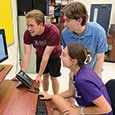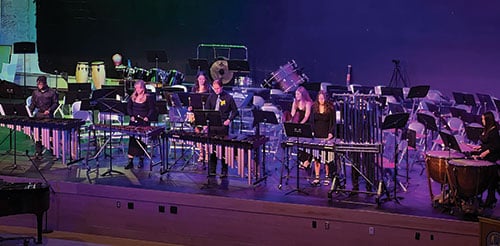
On May 16, 2024, Washingtonville High School (NY) performed their annual spring band concert. For the first time, the school gave a concert where all of the wind ensemble music and one piece performed by the concert band were composed, rehearsed, and conducted entirely by students. The student-led rehearsals became a fully immersive experience that stretched far beyond simply showcasing student compositions. For the composers, it provided a distinctive opportunity to build leadership skills. The band took charge of every facet of the music-making, and by concert-time they were proud to know that they would be world premiering five original compositions by their friends.
The Spark
Senior Ryan Godfrey provided the initial catalyst for this project. With guidance from his middle school band director, Laura Giorgio, Ryan composed several full-band compositions before entering high school and wrote eighteen full wind band pieces while in high school. Six of his pieces have been programmed at concerts by three different schools.
Last year Ryan, along with Ella Dueck and Jack Carola, took Jeremy Groth’s digital production class. There, using SoundTrap, a digital audio workstation program, they learned the fundamentals of composition, including writing melodies, creating chord progressions, and understanding compositional form. One of their class projects would eventually turn into Ella’s and Jack’s compositions for this year’s band concert.
At the start of school, we asked Ryan to compose a piece for his final high school concert. He then encouraged Ella to rescore her previous year’s composition for our band. Once Jack heard Ryan’s and Ella’s pieces were going to be performed, he decided to write a percussion ensemble piece based on his composition from digital production class. Around this same time, Andrew Dahlstrom also became interested in composing. Once again, Ryan’s influence was essential.
The five compositions performed at our spring concert were: Journey’s End for percussion ensemble by senior Jack Carola, Phoenix Rising and The Adventure Begins for wind band by senior Ryan Godfrey, Soaring by junior Andrew Dahlstrom, and Petrichor by senior Ella Dueck.
Compositional Inspirations
Whether drawing from personal experiences or media, these composers had creative insights that shaped their work. Jack commented, “The concept behind [my] piece was to create the ending credits music to a story-based video game. You’d be able to look back on your journey and see all of the memories you have made along the way.”
When composing, Ella tries to create a visual story through music. “I draw inspiration from movie scores,” she said. “Composers like Hans Zimmer, Daniel Pemberton, and John Williams have made a huge impact on my music, and I always strive to tell a story through my compositions. While writing Petrichor, I incorporated cinematic themes while telling a story through music.”
Ryan was inspired by his experiences as a band student in the district. “When composing The Adventure Begins, I drew on my memories as a Washingtonville music student, with the goal of crafting a symphonic love letter to the music program to be premiered at the final concert.”
Andrew’s work portrayed his experiences from honor band festivals. “Playing in honors ensembles inspired me because I wanted to recreate impactful moments that I felt during those festivals in a creation of my own,” he said. “There is always one moment in a program where my heart drops, and I become engulfed in the music. I do my best to recreate that moment in my pieces.”
Guiding the Compositional Process
The compositions developed over several months. Early on each student worked on their own without help. Once they had enough material to share, we met with them individually to offer suggestions. We deliberately guided them in a way that allowed each student to make their own musical decisions. Often, just listening to their music allowed us to share ideas. Incorrect notes or unintended clashes of harmonies were obvious items to point out. More detailed recommendations addressed orchestration, potential balance problems, and technical facility difficulties. We gave students options, never prescribing a solution.
Making revisions was a key part of the composing process. After listening to the music live, each student noticed musical issues to correct. A balanced sound on a computer did not always translate to an ensemble performance. Balance was the most common problem, requiring adjustments to dynamic markings and instrument doublings. Whatever they settled on, it was correct as long as it was an intentional decision. Andrew recalls, “I was disappointed that I had to scrap ideas, but looking back, I now realize how important it was to do so. I learned not to force a musical idea to work if it just doesn’t.”
It was essential for students to hear their music played with the band. Playing music back on a computer is far less exciting than hearing it on acoustic instruments. Students understood that having it read in rehearsal did not obligate us to program it on a concert. However, if the piece was well-scored and engaging, we might choose to program it. After hearing their music come alive, the student composers took the initiative to schedule appointments with us to go over their work.
We weren’t surprised that the composers had great experiences. However, we did smile at how excited the rest of the band was to play their music. Several younger students started composing, too.
There was one significant advantage to using student compositions over commissioning an outside composer. These students knew the strengths and weaknesses of each section of the ensemble. They could write parts that featured outstanding players. Ryan knew he had a fantastic euphonium player and acoustic guitarist in the band and wrote them a long duet in the middle of his piece. Ella added an important piano part for Ryan in her work.
Jack tailored each part of his percussion ensemble piece to emphasize each person’s strengths. He wrote challenging technical parts for the experienced mallet players while crafting manageable battery parts for the less experienced musicians. Andrew emphasized difficult running lines in the upper woodwinds, knowing that there were All-State level players in the sections.
A favorite memory during the composing process was watching Ryan help Andrew while they sat on the floor in front of my computer. Seeing Ryan in the role of mentor and teacher was incredibly special. He analyzed the score and its problems as easily as someone can see a math problem with a wrong answer. Andrew was sincerely appreciative of Ryan’s help.
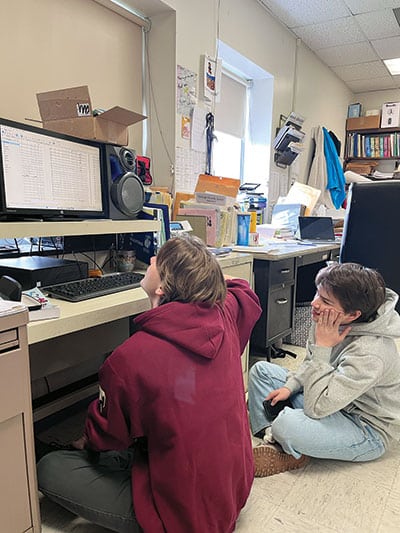
Rehearsals
Daily rehearsals were the most rewarding part of the project. Because the composers were so immersed in their pieces, it was their job to make the music come to life. We handed over the reins to them for eight weeks. Though Ryan and Jack had conducted before, it was a new experience for Ella and Andrew. To get comfortable on the podium, they started conducting daily warm-ups. This taught them what it feels like to have 55 sets of eyes on them and how to show basic conducting patterns.
Andrew recalls, “At first it was incredibly nerve-racking and definitely harder than it looked. After some time, however, I realized that I was really just making music with my friends and peers, and it got a lot easier after that.” We quickly shifted to conducting run-throughs of their pieces.
As the students gained experience on the podium they took over rehearsal planning. Because they knew their compositions intimately, leading rehearsals came naturally. We remained close by to make suggestions in our respective rehearsals. Having students conduct was not only beneficial to them, but was an engaging and insightful experience for the rest of the band, too. “I had so much fun playing music written by my friends,” said Sophie Kilcoyne, junior oboist. “Our ensemble was always engaged by the pieces our friends made, so it never felt boring. The ensemble showed so much respect to the student composers. The composers were all working with good friends, people who wanted them to succeed.”
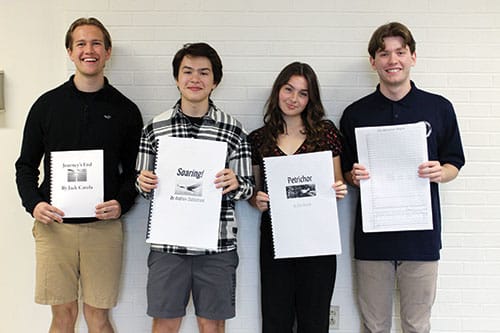
A Culture of Support and Trust
One element that made this endeavor so successful was the existing band culture in the Wind Ensemble and Concert Band. These ensembles thrive in an atmosphere of respect and support. We give sincere compliments at each rehearsal and make it customary for students to demonstrate genuine, enthusiastic applause or cheer any time someone does something well. We knew this attitude was genuine when students shared a story from an honor band rehearsal they attended. One commented, “We finished a run through of the piece, and I put down my flute and prepared to clap for the performance. Then, I realized that no one else was clapping.”
It was wonderful to see our norm of encouraging fellow students continuing during the student-run rehearsals. “My favorite memory was when I asked the students to sing through their parts,” Andrew said. “When they finished the class broke into applause! It was rewarding to know that everyone else was enjoying the process as much as I was.”
“Some of the most important things I learned was to always be kind, respectful and supportive of the musicians,” Ryan reflected. “Providing frequent sincere compliments is incredibly important. Point out the things that they are doing well, and compliment individuals who are really doing their best. It goes a long way with ensemble members.”
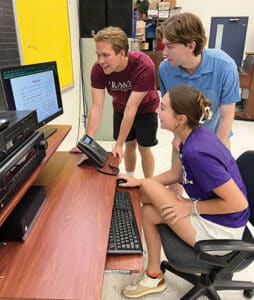 In addition, the students hold a deep respect for the music they perform, and they hold each other accountable to a high level of preparation and performance. Within the ensembles, students do not audition or compete for placement. All students are eligible to audition for solos, and students play different parts on different pieces of music. Because of these standards, there is an unspoken recognition that every member of the ensemble is critically important to the group’s success, and this is apparent in how students interact during rehearsals.
In addition, the students hold a deep respect for the music they perform, and they hold each other accountable to a high level of preparation and performance. Within the ensembles, students do not audition or compete for placement. All students are eligible to audition for solos, and students play different parts on different pieces of music. Because of these standards, there is an unspoken recognition that every member of the ensemble is critically important to the group’s success, and this is apparent in how students interact during rehearsals.
“What really allowed our ensemble to pull this off would have to be the atmosphere of our band room,” said Brady Crowe, an 11th grade flutist. “We’re all friends in that room, we clap after solos, encourage one another during rehearsals, and most importantly have each other’s backs.”
Advice for Helping New Composers
If you have a student with prior composing experience, you may only need to provide guidance as they share their work with you. However if you have eager students with no prior experience, here are a few ideas to help them get started:
• Create melodies by ear at first. As a starting point, have students use their primary instrument or piano to improvise short melodies. Initially, have them record themselves so they are not shackled by music notation. Once they have some ideas they like, give them advice on how they can expand their melodies to form musical phrases.
• Document their progress. Using a music notation program helps students transcribe their melodies. This way, it will be easy for them to experiment with adding additional parts.
• Help them with the fundamentals of composition. Teach them about the basics of compositional elements – use of repetition, building phrases, form, structure, and chords and progressions to fit their melody.
• Create accompaniments. Help them with crafting accompaniment parts that properly fit their melodies harmonically speaking.
• Assist with scoring. Guide students in making decisions as to which instruments will get the melody versus the accompaniment parts making sure the students stay within a comfortable playing range for each instrument. (Most music notation programs will highlight notes that go beyond the normal playing range of an instrument). Refer to scores of familiar compositions to see how professional composers arrange their parts (e.g. in easier music, the saxophones and horns typically have the same parts).
• Help with percussion instruments. Unless students have percussion experience, they will need to learn the basics of each percussion instrument. Take students on a tour of your percussion section, allowing them to experience each instrument. You will likely need to help them with notating what they are envisioning. Show them percussion parts to provide notation examples.
• Talk to other students. Have student composers talk with players in other sections of the band to learn the fundamentals of each instrument. Encourage composers share their music with the other students to learn if the music is playable.
• Play secondary instruments. Have beginning composers start playing as many secondary instruments as possible.
Advice for Starting Student Conductors
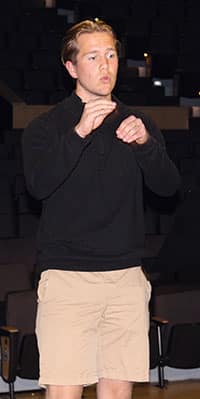 The initial goal is to give students experience on the podium in a non-threatening way. Prepare them in advance so they can demonstrate basic conducting patterns. Once they are comfortable, have them conduct the band’s warm-up exercises. If needed you can co-conduct on the side of the podium so they have a model to imitate. Depending on the students, they may need multiple times on the podium before feeling comfortable enough to conduct their own piece. After each rehearsal, try to meet with them to discuss what went well and the plan for the next rehearsal.
The initial goal is to give students experience on the podium in a non-threatening way. Prepare them in advance so they can demonstrate basic conducting patterns. Once they are comfortable, have them conduct the band’s warm-up exercises. If needed you can co-conduct on the side of the podium so they have a model to imitate. Depending on the students, they may need multiple times on the podium before feeling comfortable enough to conduct their own piece. After each rehearsal, try to meet with them to discuss what went well and the plan for the next rehearsal.
Once they get used to the process they can start creating lesson plans for your review. Depending on student skills and the rapport they have with the ensemble, you can decide how much or little you want to steer the rehearsal. We were fortunate to have four very strong students, but we still sat next to the podium with a score guiding rehearsals by sharing suggestions as needed.
Lessons Learned
• Our students can accomplish more than we could ever imagine with the opportunity and the space to grow. They need the freedom to make mistakes and the guidance to learn from them. Making mistakes or changes are not failures; they are part of the process.
• Creating and sustaining a collaborative, supportive culture makes everything better in class.
• Through the rehearsals, each composer was challenged with questions about their music. Each question demanded a thoughtful answer or decision by the composer. It was important to us that each student make these decisions with a clear, thoughtful rationale, but the final decision always belonged to them.
• Not all compositions will be ready or appropriate for public performance. All compositions can be given time for reading in a rehearsal and the opportunity to make changes for the purpose of becoming a better composer. Be clear and upfront about expectations and opportunities that may or may not be possible.
The Concert
As a gift for all of the hard work that they did, we wanted to do something special. At the beginning of the concert, we presented all of the composers with their own custom baton. Though we had program notes printed in the concert program, each composer spoke about their composition and the experience of preparing it with the band.
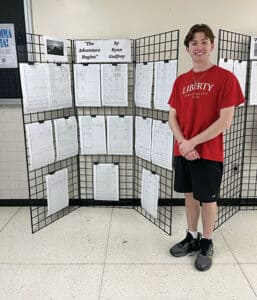 To help the audience understand how much work went into this project, we posted the musical scores on display panels just outside the auditorium. As the concert ended, we announced that the composers would stand at their displays for photos and autographs. It was a wonderful way to finish.
To help the audience understand how much work went into this project, we posted the musical scores on display panels just outside the auditorium. As the concert ended, we announced that the composers would stand at their displays for photos and autographs. It was a wonderful way to finish.
We have never received so much positive response from a concert. Students were thrilled to help turn their peers’ dreams into reality. Junior flutist Jaclyn Chubay commented, “Seeing my friends up on the podium conducting the pieces that they worked so hard on filled me with a sense of pride. The student pieces also gave me the rare opportunity to speak directly with composers about their music and intentions.”
For the directors, it was the first time that we sat back at our own concert and watched the wind ensemble perform without help. We will never forget this experience.
To see performances from this project, use the QR code below or go to: https://youtube.com/playlist?list=PL-EDE9WRcsbqxkL4nqddrUPPaf3eZ-8EQ&si=w6UNu2KEhte8Ea9b
* * *
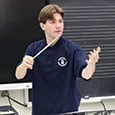 Ryan Godfrey will attend SUNY Potsdam’s Crane School of Music to study Music Education with a minor in Music Composition. He has been a member of numerous honor bands including the NYSSMA All-State Symphonic Band and NYSBDA Honors All State Symphonic Bands. After college he hopes to be a published composer of band literature and a high school band director.
Ryan Godfrey will attend SUNY Potsdam’s Crane School of Music to study Music Education with a minor in Music Composition. He has been a member of numerous honor bands including the NYSSMA All-State Symphonic Band and NYSBDA Honors All State Symphonic Bands. After college he hopes to be a published composer of band literature and a high school band director.
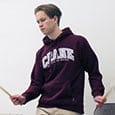 Percussionist Jack Carola, will attend SUNY Potsdam’s Crane School of Music to study Music Education. During high school he performed in the NYSSMA Area All-State Band, Senior High All County Orchestra, and various community ensembles. He plans on becoming a music teacher to share his passion for music.
Percussionist Jack Carola, will attend SUNY Potsdam’s Crane School of Music to study Music Education. During high school he performed in the NYSSMA Area All-State Band, Senior High All County Orchestra, and various community ensembles. He plans on becoming a music teacher to share his passion for music.
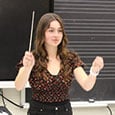 Ella Dueck will be attending New York University to study Music Composition and Screen Scoring. As a clarinetist Ella has been a member of many honor bands including All County, Area All-State, and the NYSBDA Honors All State Symphonic Bands, and the NYSSMA All-State Symphonic Band.
Ella Dueck will be attending New York University to study Music Composition and Screen Scoring. As a clarinetist Ella has been a member of many honor bands including All County, Area All-State, and the NYSBDA Honors All State Symphonic Bands, and the NYSSMA All-State Symphonic Band.
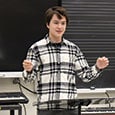 Andrew Dahlstrom is entering his senior year at Washingtonville High School and hopes to go to college for music education. Andrew has been a member of the NYSSMA Area All-State Band, Senior High All-County Orchestra, and various community ensembles.
Andrew Dahlstrom is entering his senior year at Washingtonville High School and hopes to go to college for music education. Andrew has been a member of the NYSSMA Area All-State Band, Senior High All-County Orchestra, and various community ensembles.
